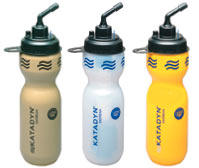 The recent hurricane and the resulting catastrophe got me thinking. A talk with my sister, my daughter and other members of the family showed me that most people are quite ill-equipped to deal with even a small emergency.
The recent hurricane and the resulting catastrophe got me thinking. A talk with my sister, my daughter and other members of the family showed me that most people are quite ill-equipped to deal with even a small emergency.It doesn't have to be that way. Even on a limited budget, you can being planning for anything that comes your way. It may take a while, you may only be half-prepared when the next one comes along, but half-prepared is better than nothing at all.
You first need to stock an emergency bug-out bag for each member of your family. A backpack does nicely. The basics should include idenitification, a change of clothing, any medications required, portable food that doesn't require cooking (such as protein bars), water and the means to purify water, personal hygiene supplies, baby wipes, and whatever other goods you feel necessary. Each individual's needs are different, so you may need to carry tools and batteries, a flashlight and other things, too. Decide from the various lists on the FEMA website what is right for you.
What is this?
http://www.katadyn.net/katadyn_exstream.html - the picture up there is the most popular portable water purification system on the market. It is used by hikers, campers and humanitarian organizations. You need one for every member of your family. Its little insertable replaceable filters can purify 26 gallons of dirty water.
If you can't carry it - here's another alternative...http://www.katadyn.net/micropur.html
Those are water purification tablets for your first aid kit.
And then there is this:
http://www.fema.gov/areyouready/
Its a link to the FEMA website with documents you can download so your family can be prepared for any emergency.
For years, because of our military lifestyle, my family lived in some hazardous areas of the globe. We survived 4 major typhoons in the Philippines. We survived a major typhoon on Guam, where the island's power plant was so heavily hit that the only two generators left on the island were for the hospital and the supply depot. We had an hour of electricty each morning and evening. Milk was $6 a gallon. A pair of low quality children's shorts were $50. I learned to sew out of financial need - no way could I afford that kind of price for children's clothing. We only had to survive that way for 4 months.
In Northern California, an earthquake took out a major section of hightway. A few weeks later a massive mudslide took out a section of the OTHER major highway. Prices were so high I had to get a job to make ends meet. We ate tuna and hamburger and were thanking our lucky stars we could afford it. That only lasted about 6 months.
As I wrote before, Hurricane Elena took us out for a week back in 1985.
When we lived back east in Pennsylvania, we survived the Blizzard of 93 and the Blizzard of 96. And with one - I had 5 kids and a grandmother trapped with me in our house. We ate well and kept warm thanks to alternative cooking and heating.
Here in Texas, our first year we survived massive flooding.
Each time, because of my husband's gift for planning, we were prepared. We've kept a stock cupboard since the day we married. We have food essentials, medical supplies, packed clothing, blankets and alternative methods of cooking our food and keeping warm. We keep our gas tanks at least half full (most of the time - I'm famous for letting the gas fairy fill her up on weekends when I run it out to the point the red idiot light is blinking).
The point is - we've always been prepared for a disaster. We don't wait five days before it crops up on the radar - we started preparing years before and as we go shopping we get an item or two each time "for the stockup cupboard."
Check out FEMA's website. They offer FREE classes in how to be a First Responder, free information on how to pack a 72-hour bug-out bag, free information on how to survive well in a natural/man-made disaster. Start stocking a disaster cupboard. Find all your important papers and identification and make copies to slip into a special bag that stays in the stock cupboard (and can be grabbed on the way out in case you have to leave fast). Make back-up copies of precious photos and your books (if you are a writer). Practice emergency procedures with your family. Designate a meeting spot away from the disaster.
Be prepared. It saved our lives. It can save yours.
Email me if you want more information or other websites to look at (including some radical survivalist websites with lots of excellent information, but can be a little scary with their predictions of gloom and doom).

1 comment:
what an AWESOME post, merry!!! THANKS for all of the info.
Post a Comment